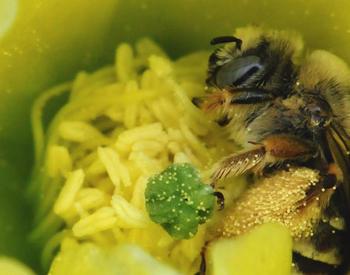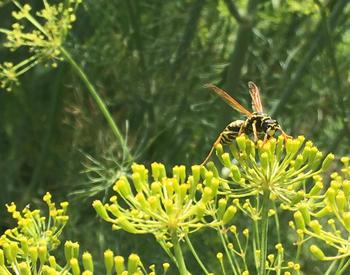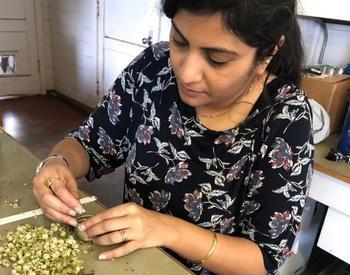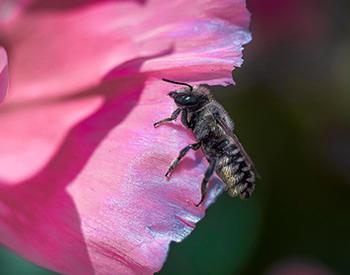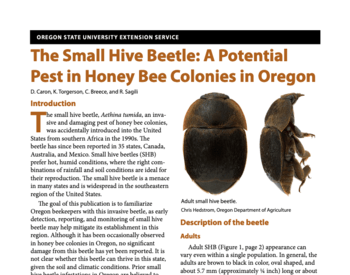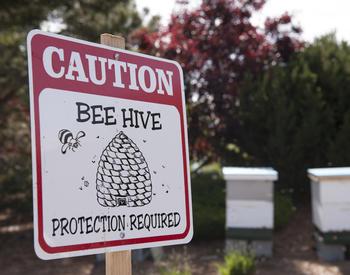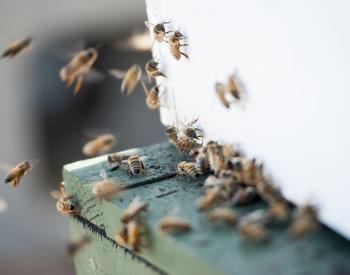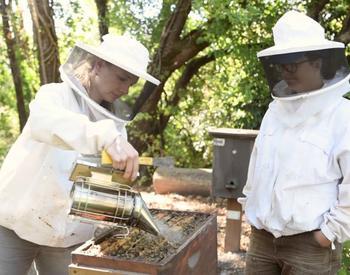Transcript
Speaker 1: From the Oregon State University Extension Service, this is Pollination, a podcast that tells the stories of researchers, land managers, and concerned citizens making bold strides to improve the health of pollinators.
I'm your host, Dr. Adoni Melopoulos, assistant professor in pollinator health in the department of horticulture. Honeybees are frequently held up as an example or a kind of metaphor for human societies. We can think of, you know, one of the most recommended books on pollination is Tom Sealy's Honeybee Democracy, where, you know, there seems to be kind of an affinity between Honeybee colonies and how society ought to act. This is a long tradition, it goes all the way back through history, and I think one of the most exemplary books that kind of takes this idea and twists it slightly is what is the Topic that we're going to be talking about today. Bernard Mandaville's masterpiece work, The Fable of the Bees. It starts as a poem at the beginning of the 1700s and is expanded throughout that period. And it is a hugely influential book for people who come later, to think about things like the American Revolution, for example, and the thinkers associated with it will trace themselves back and will have read someone like Bernard Mandeville. Now to help us get at understanding this book, it's very complicated and it has maybe not so complicated, but in some ways, it may seem very unfamiliar to us.
I needed a guide so I reached out to Spencer Leonard, who is a historian who primarily works on South Asian studies, but he really focuses on the period sort of in the aftermath of Bernard Mandaville, so India in the 1700s. This is going to be a two-part interview. It went on for, it goes on for a little while and we really get into the depths of this book and I really appreciate it because I've read this book, I love it, and I'm happy to have a guide and I hope that you are too. So this week on Pollination, we're going to do part one of Bernard Mandaville's Fable of the Bees. Okay, well welcome Dr. Leonard to Pollination. Thank you, Donnie.
Thanks for having me. Now today we're going to be talking about this book called The Fable of the Bees. Can you set the historical stage of this book? Who was Bernard Mandeville and describe the world that he was writing in?
Speaker 2: Well, Bernard Mandeville was a Dutch man of letters. He was an educated man, actually a physician who was born in 1670. He was educated in the town that he was born in, Rotterdam, but he lived most of his adult life in London becoming a kind of adopted Londoner, writing primarily in English. He was that most English of creatures. He was a wig. A wig? Wig, W-H-I-G. Just to say that he was a defender, he was an arch-defender of the Revolution of 1688.
Not just because it put the Dutch stadtholder William of Orange on the throne of England, but because it guaranteed the Protestant succession to the throne of England, it guaranteed religious tolerance. And above all, it gave scope to the still emerging urban and commercial bourgeois, if you will, society to which Mandeville was so attached. He wrote his most famous work, The Fable of the Bees, in 1714, republishing it to much wider acclaim in 1723. Though like all great works, The Fable of the Bees had important precursors and, of course, was influenced by all sorts of currents of thought that were circulating in his day, it's important, crucially, we remember it, above all as a pioneering work in the science of society. So, we're going to explain some of the background of that and really what it means to come up with an idea about society and why that matters. If we think of the rise of modern society as a deliberate project, a conscious project, as opposed to what it also certainly was, which is a kind of happy accident, arising from the crisis of medieval society in Western Europe, we have to begin with the upheaval in the European worldview for thinking about it as a conscious project. We're thinking about something that people are doing, if we're thinking about something that people are willing to be, then we have to think about the transformation of the European worldview that we call the Reformation. Of course, the Reformation wasn't only about worldview, it involved many material changes, most obviously in the confiscation of church lands and the erection of a new type of sovereign state in many northern, central, and western European countries. But more fundamental than this is the emergence of the modern subject.
Sort of in an external way, we can think about something like vernacular literacy. In a more fundamental way, we can think about the individual conscience, the emergence of the individual conscience, implied by the theological concept of the priesthood of all believers. So this kind of change is accompanied by lots of other stuff, right? By the scientific revolution, I'm sure that many of your listeners know about, as well as the great discoveries that exploded the worldview of the past, namely the discoveries of Christopher Columbus and Vasco de Gama. There just isn't any mention of the shape of Africa or the very existence of the Americas in, say, the Bible or in Plato or Aristotle. They had no idea.
So this was the most obvious kind of scientific breakthrough. However, the Reformation was rooted in the individuals of society at large. With it, the old cosmology of medieval life is shattered. In Mandeville's native Holland, as in Britain, the Reformation's inspiring revolution, the Dutch revolt of the 16th and 17th centuries, the English Civil War from 1640 to 1660, which founded, of course, the English Republic, the Cromwellian Republic for a brief time, and the glorious revolution, which is what's most relevant for our purposes of 1688. And that really raises the question of the relationship of the Reformation to the Enlightenment, right? In other words, in 1688, we started to see a modern revolution in the service of modern ideals and the advancing of modern society semi-explicitly. On the one hand, the revolution of 1688 enshrines the rights of man in the English Constitution.
You might even say it established the modern British Constitution, at least on a distinctly new basis. Nevertheless, the precipitating cause of that revolution was a conflict between Catholics and Protestants or between Catholicism and Protestantism, between absolutism, and what was viewed as Protestant, namely parliamentary government, the need to get rid of James II, the self-professed Catholic prince what precipitated that revolution. So when we're speaking about the Enlightenment, when we're speaking about that transition from the Reformation to something beyond that, we're talking about the 18th century. Its task was not simply to liberalize Christianity in the sense of moving it towards a more sort of rational religion like deism or rendering religion more compatible with reason. And it has to displace Christianity as the basis for understanding human institutions and social arrangements.
It has to answer the question, pardon me, what is the basis of human cooperation and flourishing? So there was a great Dutch radical named Pierre Bale, who was slightly older than Mandeville in teaching in Rotterdam when Mandeville was a youth. And he had already provocatively maintained that a society of atheists would be more sociable, more peaceful, and more cooperative than a society of Christians. But it's really left to Mandeville to inaugurate a post-religious conception of society, i.e. something that understands that society is not ordained by some outside power, but rather it's something that arises amongst the natural species that in his view isn't fundamentally different from other species. And that society develops through historical stages on the basis of molding and channeling natural passions and impulses, again, that have corollaries amongst other species. And that ultimately, and this is really what he's after, and it's certainly something that the 18th century would spend a lot of time refining, that commercial society or modern society, bourgeois society, doesn't need religious sanction. And it doesn't have to account for itself with reference to that. And crucially, that it provides from within itself its moral basis.
And I know that I've said a lot here, but just let me finish with this point. Mandeville is concerned to say that our morality, the way that we relate to another cooperative, peaceable, moral way is not due to our possessing some spark of divinity or some uniquely human sort of moral faculty, but that morality, and indeed he suggests reason itself arises historically from within society. So that nothing short of a science of society, he feels, is required to justify and advance the new revolutionary order emerging most decidedly in the London of his day. So, of course, in the other great cities of Western Europe, but above all in London, which is why he loves London so much. So Mandeville forges the modern conception of society that later thinkers will refine. He does so as a revolutionary wig, who's staunchly defensive of the revolutionary settlement that is the basis of the social institutions that he lives in post-1688, Great Britain.
Speaker 1: Well, that was fantastic, a real tour de force of this history. And I do want to take up this question of a science of society. As you mentioned, I really like what you said that these revolutions that took place in the 1600s were revolutions that kind of set society on a new basis and came in the wake of the Reformation or the heart in the heat of the Reformation and these discoveries, the Enlightenment. And I guess the question is, what is this basis? And I was listening to a BBC show on the fable of the bees and one of the scholars on the show remembers talking to a honeybee biologist about the hive that Mandeville describes and the biologist commented that none of this had any biological validity. And so thinking about on what basis this new society, isn't it mentioned, for example, that Mandeville instead of more sort of the ancient virtues would sort of high foreground what it is to be human? But this question of what to be human is not closed.
But you may set at the end, it's, you know, a historical question. I'd love to hear you expand more on what this all means. What is, what would a science of society look like? And why is it not analogous to, you know, me as a, you know, a person who studies social insects can do that it is, you know, it's a different pursuit. So And the peculiarity that he seems to use honeybees as the basis for, you know, this point of departure seems, you know, is this deliberate?
Speaker 2: He's interested in you obviously he has to account for the fact that human beings have all sorts of bizarre behaviors, you know, they wear clothes, they practice all the tricks of social mores, they say, please and thank you, they have all kinds of curious practices by the early 18th century, which obviously have no corollary in nature.
All right. But what he's giving is an account of how he's beginning to suggest it's very preliminary. But, you know, what I was trying to say in a condensed way is that the behaviors that you see in other animals, and he is more talking about other animals, other species. He's talking about how they have sociality in primitive forms like family form, as you can see in nature. Of course, they're more complex social forms like beehives is obviously what he's going to be talking about, humans have this impulse toward sociality, which is reached, of course, an immensely complex level by the time he's writing, that he's suggesting that there's a route from natural forms of sociality, which themselves are rooted in instincts, what I call passions. Towards acceptance, towards approval, towards, you know, of course, nurturance being offered intergenerational within the species, etc. All of this has been honest to create this new thing, which he isn't going into great detail about, but is going to get elaborated in a massive way in the 18th century, which is the idea of history as a theater within which our instincts are molded and remolded in evolving social environments within, in other words, an environment that isn't just defined by the wide world of nature and the other species but is ultimately an environment we're creating for ourselves. That's what we mean by society in history.
And that's what Mandeville's getting at, right? That's what I mean to say, he has the idea of society itself as a thing, which, you know, perhaps your listeners do or don't think about, right? That society is a thing, right, that we deal with and that we take for granted. And our normal idea is that we're sort of forced into it and that it impinges on us and that it sucks and that, you know, it has cops and that it has thought police and that, you know, we resisted as individuals, but of course, it's also produced us as individuals, right? And we are products of, even in our distance from and in our hatred of our resentment of society, we are a product of it. And that's what Mandeville's getting at, right? And he's mocking people who think society is based on being good.
Like, you know, I could say more about that, right? But he's trying to say the thing that produces our morality is itself amoral, you might say, right? It's neither moral nor immoral, but it certainly harnesses the whole human, including our basest instincts, right? So he's saying, if you Christians think that being selfish is a vice, if you think greed is a vice, I can assure you that it's at the very basis of what you take for granted in your everyday life, right? Because greed is what drives the economy, people are trying to screw each other, people are trying to get the best bargain for themselves.
They're not, you know, loving their neighbor as they love themselves. This is not a way to understand the real world, right? And if you're saying that, then let me tell you, the world is a very sinful place, right? It is a lot of his rhetoric comes from a kind of mocking of the old morality.
It really is a futile morality, which claims that you know, what was, of course, a barbaric form of society was based on God's law. And of course, it was based on, thus it was good, it was based on goodness. And the best people, right, were entitled to rule, right? This is the idea that the elites have, right?
And so Mandeville is radical in saying, no, the people who claim and have their ostentatious philanthropy and their ostentatious good deeds, they're not better than, you know, the common artisan who's contributing to society, in fact, is doing so without, you know, with less hypocrisy and, you know, bunk them, basically.
Speaker 1: Fantastic. Well, let's take a quick break. I want to come back and dive into the poem that sort of anchors the fable of these, what actually the fable of the bees is. So let's take a quick break. We'll be right back with Dr. Spencer Leonard here on pollination.
Fantastic. Well, before the break, you did a marvelous job of setting up the world in that Bernard Mandeville is writing the fable of the bees. And I just want to pick up on, you know, his approach to, you know, society, the science of society, and specifically, you know, you know, the book opens with this poem, which is kind of ASOP-like. And the title is The Grumbling Hive, or Naves Turned Honest. So this clearly is a very peculiar kind of hive. So can you tell us a little bit about what is, what is, you know, how is Mandeville taking these themes and sort of using this honeybee colony as this peculiar one to be able to bring these themes out? What's peculiar about Mandeville's bees?
Speaker 2: Yeah, Mandeville is, you know, he, he's a scientist's thinker. He is a scientist of a sort himself. He was educated as a doctor in one of the great medical schools of his day, the University of Leiden. And what he actually wrote is his dissertation, defending a Cartesian view of animals versus humans, the Descartes, you know, René Descartes, from which we get like Cartesian graphs, you know, great mathematician and philosopher of the 17th century. He has an idea that human beings are intelligent in a way that animals simply are not, and that there's an ontological divide between humanity and nature.
Mandeville agrees with that as a young man, he breaks with it almost immediately in his 20s. And he's what we would call a psychiatrist. He works, he looks at the area, he looks at hypochondria. He attempts to get people to calm down basically, to cope with their everyday lives better. And the more he thinks about it, the more he relates human behavior with animal behavior. And he loves, you know, of course, there's a kind of a primal, there's a deep impulse to doing that in human civilization in the form of animal samples. And humans have always said of each other that, you know, you're a pig or you're a rat or you're a dog or whatever.
Right? We've always seen ourselves in nature. And he loves that. He's a translator of animal fables. But the most famous one is this, is the fable of, if his fable is the fable of the bees, which he composes an original poem. It's not a masterwork of literature. It's kind of not supposed to be actually. He has a lot of fun in the opening. It's a little vulgar.
He says, you know, call it dogma rolls. You know, he's in one of the things that if you think about what he's saying there, he's saying, this is not epic. This is not a lyric. This is not this.
This is not that. Because it's expressing something new. It's vulgar. It's dogarole. It sounds like street poetry.
It sounds like something that people would recite on the streets of London to catch a penny from someone passing by. Because that's it's it's expressive of the modern age. Right. So he's rejecting all of these old verse forms. Right. And he's saying, no, this is the new, you know, the vulgar, the dogarole, the bourgeois. Right.
This is the idea. So, you know, I, I, I noticed that there's a book that probably a lot of you, I glance at this book that I'm sure that some of your listeners are familiar with called The Hives, the story of the honeybee and us, which is by a woman who has the appropriate name of B Wilson. I don't know if that's her real name or non-deplume.
Her markable. But in any event, Ms. Williams Wilson traces the ways in which bees and beehives have served as a metaphor for human institutions. So in other words, when Mandeville takes up this fable of the bees, this metaphor of people are like bees, he's not the first by any means. Rather, the most salient use of the model of the notion of the beehive as a model of early, it is as a model of early modern absolutist monarchies. In other words, bees were notable for their obedience and their operating smoothly within a hierarchically ordered system.
Speaker 1: The absolute monarchy is something like you would see in France where you have a very centralized king overseeing kind of the development of society.
Speaker 2: Right. And that is integrating the aristocracy into a kind of single bureaucratic state order. That sort of thing, in other words, it's not feudalism. It's a stage in the development of modern society. But by this point, certainly, it's a right-wing project in comparison to the parliamentary project of England. This idea of being like a beehive is emblematic of a kind of absolutist order, of course, this isn't foreign to the English experience.
But even Henry VIII, even Protestant England can seem like it's on an absolutist trajectory when we look at something like Elizabeth I or James I. What the destiny of that is going to be? And when we look back at it, we say, well, that's the beginning of the modern state in Great Britain. But when we look, we're looking back at it through the subsequent history of the English Civil War and the Glorious Revolution and later developments that, in a sense, guaranteed or steered the English social development in a particular direction. But at the time of Shakespeare, it wasn't clear. In Shakespeare, of course, the writing in the ancient Elizabeth I gives a sense of the honeybee as emblematic of, as I say, early modern absolutism. So he puts the following lines in Canterbury's mouth and act one seemed to of Henry V. Therefore, Doth Heaven divide the state of man in diverse functions, setting endeavor in continual motion to which is fixed as an aim or but, obedience for so work the honeybees, creatures that by a rule in nature teach the act of order to a people kingdom. They have a king and officers of sorts where some like magistrates correct at home. Others like merchants venture trade abroad. Others like soldiers armored in their stings make boots upon the summer's velvet buds, which pillage they with Mary March bring home to the tent royal of their emperor.
So mandible is drawing on a different concept of bees than this. Right here you have even the economy, even the merchants venturing trade abroad. You mean first, I'll point out two things about Shakespeare actually. First of all, the merchant activity, is what we might think of as independent social activity. Is viewed as part of the state order. Right, that in this is the idea that merchants are kind of licensed by the state. You can think of something like the Virginia Company that founded Virginia the Levant Company the Royal African Company or the East India Company. The idea that the state is licensing trade rather than trade spontaneously developing in society and the state simply as it were allowing it, perhaps skimming a little off the top, some of the wealth it generates to guarantee courts and roads and things like that, but essentially staying out of it.
Speaker 1: So in Shakespeare's time in the Elizabethan, there's this, the beehive is being projected as this kind of extension of the crown. Okay, gotcha.
Speaker 2: The extension, yeah, it's an extension of the authority of state. And so of course what that implies is that there are no real property rights. Right, there's no right of society apart from the state. The other thing is that the gathering of pollen by the bees is being likened to merchants, but it's also being likened to soldiers' pillaging. Right, there's really no distinction, you know, there's no fundamental distinction being made between, you know, making war and doing commerce. Right, you can think about like, you know, what are the Spanish doing in the new world? You know, what are the Spanish in the new world just raping and pillaging the Americas or are they engaged in trade? Right, there is a kind of, you know, exchange taking place. People call it the Columbian exchange, right, between the new world and the old world. But in the early modern period, it can look like plunder.
Right. And Shakespeare is sort of saying, well, you know, the bees, they plunder, they trade, you know. So, Mandeville is drawing a different concept of bees.
And you might say it draws on the, you know, we have a lot of phrases. I don't know what phrases you've heard, but you know, one that my mother would say is that she's busy as a bee, you know. How's your day been today?
How are you doing? You know, I've just been as busy as a bee. And that is an echo of, you know, what we might call a Dutch notion of bees, one that comes up in the 17th century commonly in the Netherlands, of bees as frugal, as disciplined, and as commercially successful. As, in other words, symbolic of the bourgeoisie itself.
Speaker 1: So, it's so much different than an idea that you can't really discern trade from pillaging, but busy as a bee implying they generate their own, by their kind of busyness, they generate their wealth. Right.
Speaker 2: And the emphasis is, of course, not on the hierarchy of the bee society. Gotcha. Right. What Mandibill is going to do is he's going to take the image of the hive, right, which is there in the Shakespeare quote that I gave, and the emphasis on the individual bee as frugal and active and participatory and sort of on his account. He's going to combine them.
He's also going to add another thing, which is not there in the usual use of the metaphor, which I'm sure your listeners are familiar with, which is that a beehive is not quiet. Right. Right. A beehive is grumbling.
Right. Mandibill's bees are not, you know, uncomplaining. So I'd emphasize that you know, Mandibill's bees are part of a hive. He's zeroing in on the socialities of bees, but he's, you know, he's talking about how bees cooperate with each other, but he's not emphasizing hierarchy. He's not emphasizing the queen in relation to the other bees. Rather, he's focusing on the society of the common bees, and his bees finally are free. They're talking, like they're talking to themselves about being bees.
And Monarchy sort of only comes in as a kind of a distant question. So just to give your listeners a taste. Oh, good. You're going to read a little bit.
Yeah. Here's how the poem begins. It's how Mandibill's fable of the bees, you know, the actual poem at the heart of it that you asked about, the grumbling hive or naïve's turned honest.
Here's how it begins. A spacious hive well stocked with bees that lived in luxury and ease and yet as famed for laws and arms yielding large and early swarms was counted as the great nursery of sciences and industry. No bees had a better government, more fickleness, or less content. They were not slaves to tyranny nor ruled by wild democracy, but kings that could not be wrong because their power was well circumscribed by laws. So a couple of things there, perhaps the one that will jar most with your listeners is this phrase not ruled by wild democracy.
This is because Mandibill thinks he's a monarchist. In a way that I guess I would just say to Americans, we are too. Americans don't, Americans think of themselves and their revolution as anti-monarchical. It's a very poor way of talking about it.
We might talk a bit about Mandibill's influence on the revolution, but there is no way in which America views the presidency as the British view of modernity. Okay. Right. Just as we prosecute people in the name of the state and we grant the right to the state to take human life, right? The crown does that in Britain. And it's the idea is the rule of law, the permanency of the law, right? And that the agents of the law are the agents of the presidency, right?
So we make a distinction between the president and the presidency, right? There's sort of no way that England could not be ruled by a monarch, right? If the queen dies, then this person succeeds and if they die, then that person succeeds. There's an infinite list of succession that ultimately I guess leads to you or me.
You and I could be whatever three billionth on the list of succession. Right. Yeah. In the same way, there is conceptually no limit to who can become president, right? The vice president and then the speaker, the house, and then this and that and the other, right? Because there's no way to imagine there being no president, right?
Because that would mean that the law is working force. I got you. Right. Yeah.
Right. It's in that sense that people were, people like Mandeville celebrated the English monarchy as truly defending equality before the law. So in the 18th century, the whole world, especially in the 1720s, the whole world, whether it's Benjamin Franklin in America or it's the Dutchman Bernard Mandeville in England, or the Frenchman Francois Voltaire in England, who traveled to England and celebrated English society. The whole world celebrates Britain, right?
The enlightenment in its first phase is Anglophile. And it's Anglophile to celebrate a king that's entirely subordinate to the law. That's the significance of the Revolution of 1688 when we say that Parliament is supreme, what we're saying is that the law is supreme, right? Over the king. Another way of putting it, the way that English would put it is the English monarch is the most powerful in the world because his strength is based on the law. Right? So that's what he's talking about. This is to give you a sense of, why we don't want to be represented in the making of rational laws.
It's a bunch of drunk, homeless people trying to overthrow the government or trying to dictate to the government, right? We don't want that. We want every social interest to be represented in the making of rational laws that are ultimately grounded in a discussion in which we abstract from our particular interests in Parliament assembled and on that basis identify the common good, embody it in law, and the crown enforces it. That's what's all implied there, right?
Speaker 1: And yet it's grumbling. So it's not as though they're pacified. It's not wild democracy, but grumbling is endorsed.
Speaker 2: Right. Right. So they're not, they're law-abiding, but they're not content, right? And they're not even, they're not moral either in as much as their pursuit of gain. Their daily activity is not actuated by their desire to help other people. It's motivated by the desire to serve themselves, right? They are governed by vice from a Christian perspective. Pride, egotism, a pandering to the desires for luxury and comfort in others.
In other words, it's a vice that panders to the vice in others, right? So Mandeville will even celebrate the prostitutes of London, right? And he'll say, you know, look, these people are serving a need, right? You can't say there isn't a need for them. So why attack the people who serve that need, right?
He'll even defend, you know, in a very ironic way, you know, criminals, because the criminals keep the lawyers, et cetera. So they're not content, so they're not moral, and Mandeville has a lot of, you know, mischievous stuff like that. But they're also not content because they're free. And a free society is a grumbling society.
And as the poem goes on to show, it's really the story of the poem. Their grumbling discontent is, that it fails to achieve clarity about their freedom, about their own hive life, and the basis of its prosperity and flourishing. And therefore, they talk themselves out of their society.
They abandon it. They say, let's have a Christian moral hive. And what they end up creating is no hive at all. They undermine the entire basis of the flourishing of a hive. So Mandeville is emphasizing through the poem, though he's not thematizing it in the poem, that the crucial element of the hive is the honey, the wealth that commercial society produces, and that this is necessary for the well-being of everyone in the hive.
You can't attack what produces the wealth without attacking the happiness of all the individuals that participate in it. Does that... I mean, we're also asking about this. I don't know if you want me to go into this. But the question of like... And I guess I've already implied it. The issue of... Do people... What is the consequence of not understanding your society?
Speaker 1: Well, I hope you've enjoyed part one of a two-part series we're doing this month on Bernard Mandeville's Fable of the Bees. Join us next week when Dr. Leonard returns and we explore the consequence of being self-aware of society, these themes that are being raised in the fable of the bees and how it resonates into the 19th century and the American Revolution, but also perhaps even today, what is the legacy of Bernard Mandeville.
So that'll be next week on Pollination. I hope you will join us. I'm really enjoying this conversation and I hope you are as well.
See you next week. Thank you so much for listening. The show is produced by Quinn Sinanil, who's a student here at OSU in the New Media Communications Program, and the show wouldn't even be possible without the support of the Oregon Legislature, the Foundation for Food and Agricultural Research, and Western SARE. Show notes with links mentioned on each episode are available on the website, which is at pollinationpodcast.oregonstate.edu. I also love hearing from you and there are several ways to connect with me. The first one is you can visit the website and leave an episode-specific comment. You can suggest a future guest or topic, or ask a question that could be featured in a future episode, but you can do the same things on Twitter, Instagram, or Facebook by visiting the Oregon Bee Project. Thanks so much for listening and see you next week.
One of the most influential books about bees has little to do with bees, but rather reflects on the nature of modern society. Bernard Mandeville (1670-1733) wrote and revised his “Fable of the Bees”, after publishing a poem in 1705 titled “The Grumbling Hive: or, Knaves Turn'd Honest”. The book is considered one the first pieces of modern sociology and was influential for revolutionaries later in the 18th Century. We discuss the book as part of a two-part series.
My guest this week is Spencer A. Leonard. Dr. Leonard currently teaches History at his alma mater, the University of Virginia. His forthcoming book, Marx and Engels on Imperialism, 1851-1862, revisits the question of imperialism understood as, most fundamentally, a question of the reemergence and transformation of the state under conditions of what Marx termed 'capital.' He is currently working on a study of Marx's 1853 writings on the India Question against the background of now forgotten liberal and socialist attempts to come to terms with the crisis of (capitalist) globalization.
Links Mentioned:
The Fable of the Bees (full text, available at Early Modern Texts)





